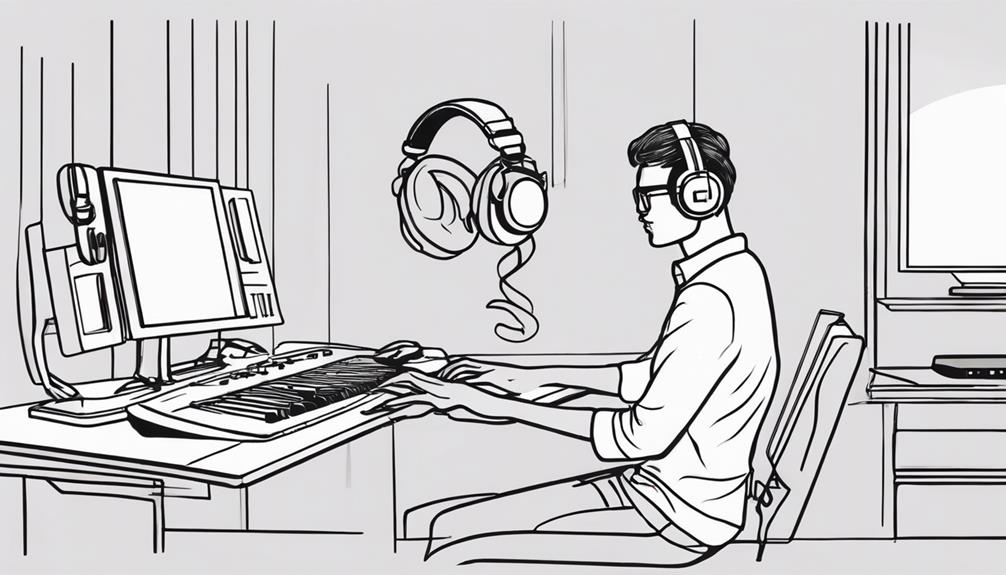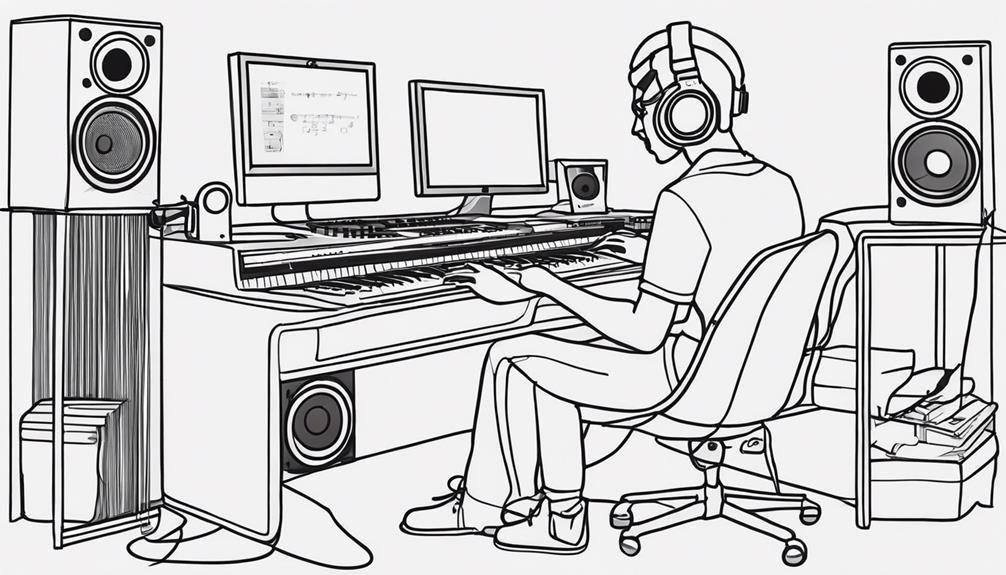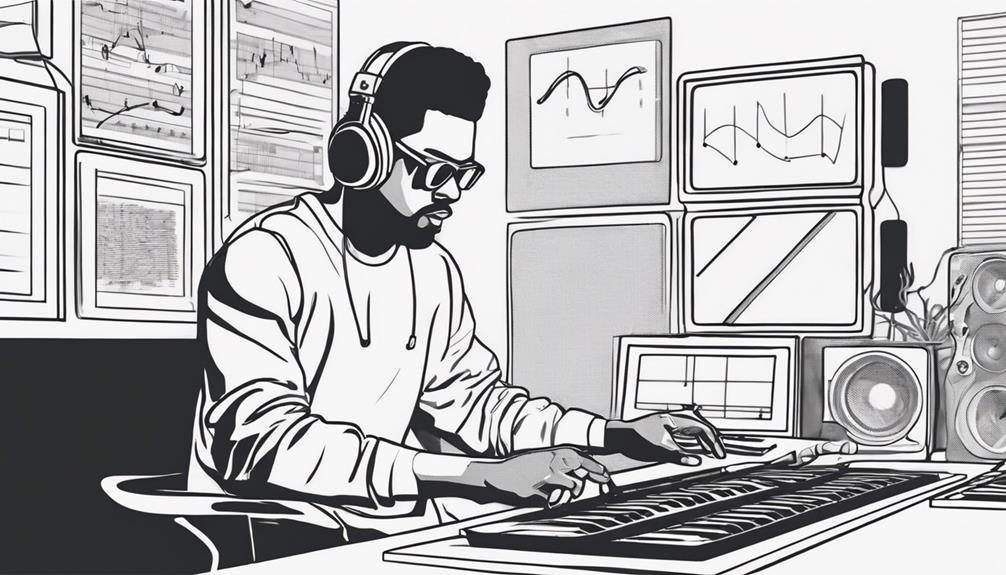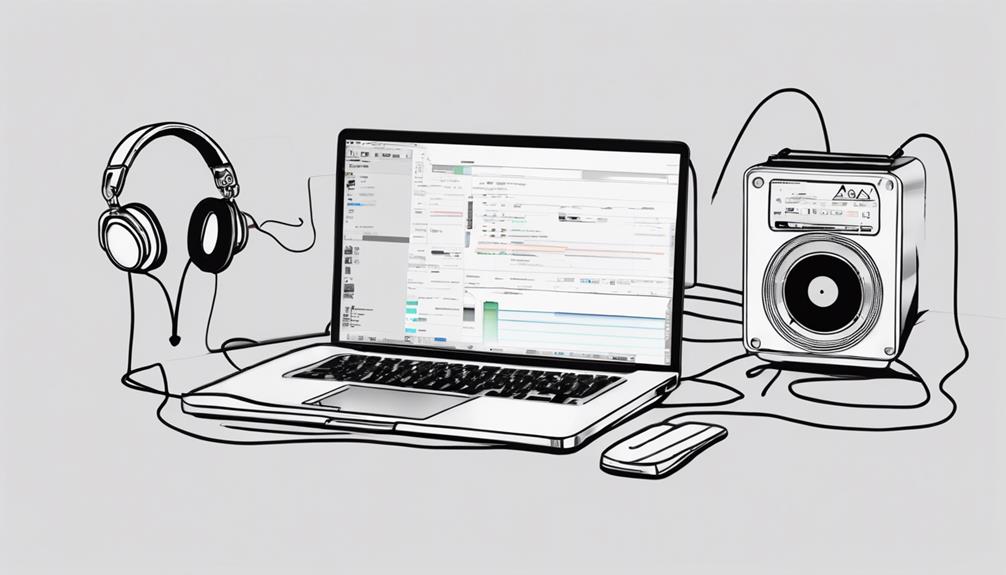Ready to jump into your music production journey? Begin by mastering music theory basics and exploring popular digital audio workstations like Ableton Live. Immerse yourself in sound design principles and experiment with mixing and arranging techniques. Explore diverse genres and tools to develop your signature sound. Learn about career paths and network with industry professionals. Practice daily, join online forums, and stay updated with trends through industry publications and workshops. By engaging with the music production community, you'll enhance your skills and knowledge. Ready to take the next step and elevate your music production skills? Start by setting clear goals and creating a structured practice routine to stay focused and consistent. As you learn music production basics, don’t hesitate to seek feedback from peers and mentors to refine your craft. Remember, the journey is as important as the destination—enjoy the process and celebrate your progress along the way!
Key Takeaways
- Begin by mastering music theory basics like notes, scales, and chords.
- Familiarize yourself with popular DAWs like Ableton Live and FL Studio.
- Dive into sound design principles and synthesis techniques.
- Experiment with different production techniques such as mixing, mastering, and arranging.
- Explore various music genres to develop a signature sound.
Music Production Fundamentals
To excel in music production, familiarize yourself with the fundamental aspects of music production. Understanding the basics of music theory, such as notes, scales, and chords, is essential for creating harmonious compositions.
Additionally, getting acquainted with digital audio workstations (DAWs) like Ableton Live and FL Studio will kickstart your music production journey. These platforms provide the tools needed to produce, edit, and arrange your tracks effectively.
Delving into sound design principles and synthesis techniques will allow you to craft unique sounds that set your music apart. Experimenting with different production techniques like mixing, mastering, and arranging will further enhance the quality of your tracks.
It's also important to explore various music genres and production styles to develop your own signature sound as a music producer. By mastering these basics of music production, you'll be well-equipped to create engaging and professional-sounding music across different genres.
Essential Software and Tools
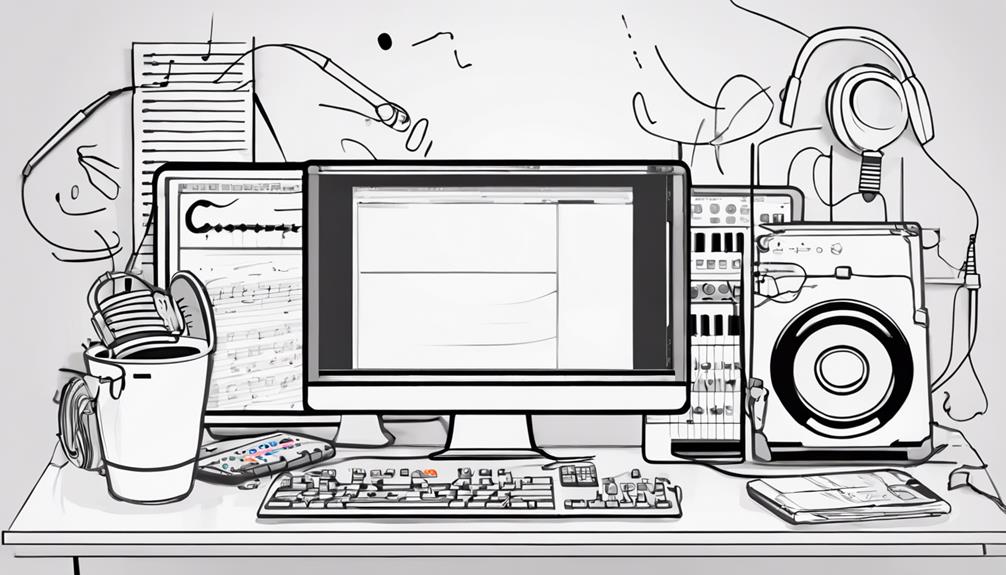
Check out popular DAWs like Ableton Live, Logic Pro, and FL Studio for your music production needs.
Invest in quality studio headphones such as Sennheiser HD 650 or Beyerdynamic DT 770 Pro for accurate sound feedback.
Consider essential tools like MIDI keyboards, audio interfaces, and studio monitors to elevate your music production setup.
Key Software Options
Explore the essential software and tools crucial for music production, including popular options like Ableton Live, Pro Tools, Logic Pro X, FL Studio, and Studio One.
When diving into electronic music, Ableton Live shines with its versatility and user-friendly design, perfect for creating electronic beats and tracks.
Pro Tools, a staple in professional studios, offers unparalleled audio editing capabilities, making it a go-to choice for industry experts.
Logic Pro X stands out for its seamless integration with Mac systems and high-quality virtual instruments, a favorite among Apple users.
For beginners, FL Studio's intuitive workflow, vast plugin support, and affordability make it an excellent starting point.
Lastly, Studio One provides a streamlined production experience with drag-and-drop functionality, advanced MIDI editing tools, and exceptional audio processing features.
Whether you're into electronic music or exploring other genres, these key software options cater to various needs in the music production world. Start experimenting with them today to ignite your creativity!
Must-Have Tools
Discovering the necessary tools for music production involves understanding the significance of essential software and tools that form the foundation of a complete production setup. Essential software includes digital audio workstations (DAWs) like Ableton Live, Logic Pro, and FL Studio, which serve as the central hub for creating music.
Tools like MIDI keyboards are essential for inputting musical ideas, while audio interfaces enable you to connect microphones and instruments to your computer for recording. Studio monitors play an important role in accurately hearing the sound you're producing, helping you make informed mixing decisions.
Sound synthesis tools, such as plugins for EQ, compression, and reverb, enhance your music's quality and creative possibilities. Additionally, sampling software like Kontakt and virtual instruments like Omnisphere provide a vast array of sounds for your compositions.
Software Tutorials Online
Online tutorials provide valuable guidance on mastering essential music production software and tools, helping you enhance your skills and creativity in the field.
You can explore online courses for key software like Ableton Live, Logic Pro, FL Studio, and Pro Tools. These tutorials offer step-by-step guides on setting up and using popular plugins such as Serum, Massive, and Omnisphere.
Immerse yourself in mixing techniques with tutorials covering EQ, compression, reverb, and delay effects to elevate your sound quality. Additionally, learn about sound design with tutorials focusing on synthesizers like Sylenth1, Massive X, and Kontakt, enabling you to create unique sounds.
Explore advanced production techniques through tutorials on mastering, automation, sidechain compression, and vocal processing, refining your music production skills. Take advantage of the vast resources available online to expand your knowledge and proficiency in music production software and tools.
Exploring Different Genres
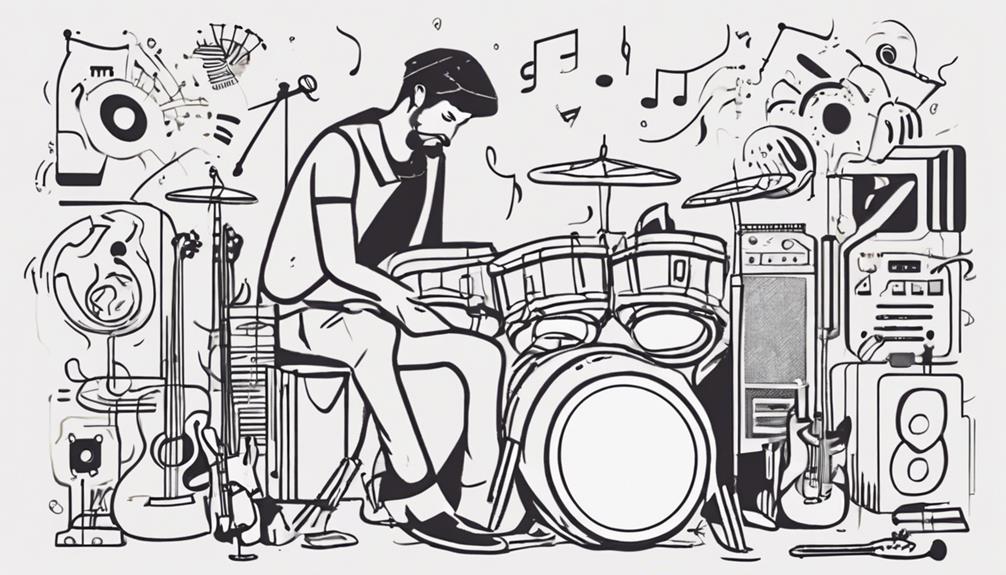
By delving into diverse genres like electronic, hip-hop, rock, and classical, you can access a world of musical possibilities, expanding your knowledge of music production techniques and styles.
Each genre offers a unique sound and specific production techniques that you can learn from. Start by studying the history and key elements of different genres to grasp their evolution and distinct characteristics.
Analyzing tracks within each genre will help you understand the production choices and techniques used by professionals. Experimenting with producing music in various genres not only allows you to explore different creative avenues but also helps you develop versatile skills that can be applied across various music production projects.
Embracing different genres won't only broaden your understanding of music but also enrich your production capabilities, enabling you to adapt to diverse creative challenges in the music industry. Start exploring today to discover a world of musical possibilities.
Industry Insights and Career Paths
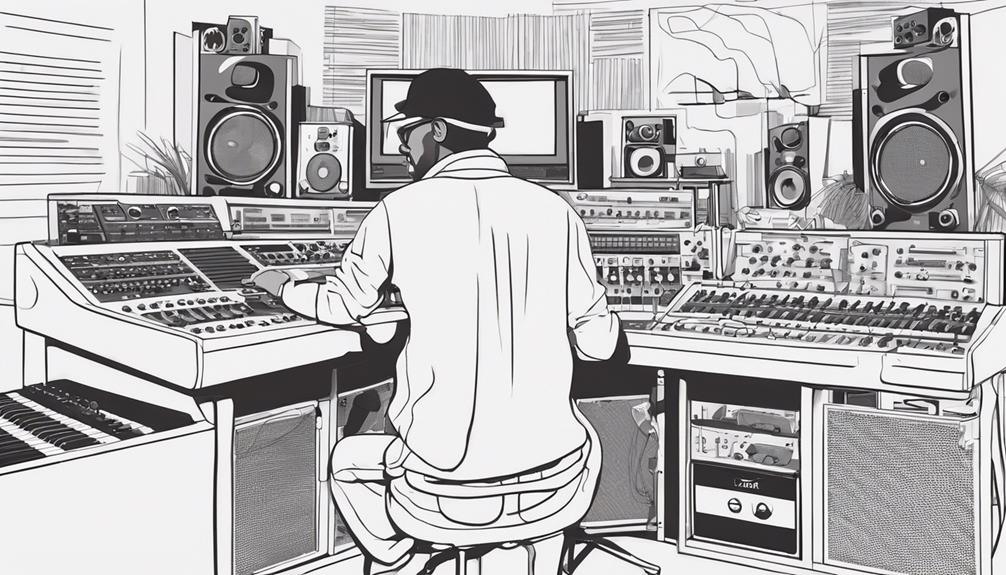
Ready to explore the vast landscape of career opportunities in music production? Gain insider tips for success, understand the growth potential in various roles, and uncover the pathways to thrive in this dynamic industry.
Let's navigate the domain of industry insights and career paths together!
Career Opportunities Overview
Exploring career opportunities in music production can lead you to diverse and fulfilling paths within the industry. As a Music Producer, you'd be responsible for overseeing the creation and production of musical recordings.
Studio Engineers focus on the technical aspects of recording sessions, ensuring equipment operates smoothly and sound quality meets standards.
Mixing Engineers specialize in blending individual tracks together to create a cohesive and balanced final product.
Many professionals in music production opt for freelance work, allowing them to work on a variety of projects and collaborate with different artists.
Networking is vital in this competitive field to build connections and secure opportunities.
Staying updated on technology and production techniques is essential to remain relevant and meet the demands of the industry, especially as the music landscape shifts towards streaming platforms.
Insider Tips for Success
To excel in the field of music production, understanding the current industry insights and various career paths is essential.
As you start your music production journey, learning about the transformed music industry landscape with streaming platforms as the primary mode of music consumption is critical.
Explore diverse career opportunities such as Music Producer, Studio Engineer, and Mixing Engineer roles to broaden your skills and experiences in the studio.
For success in the industry, consider freelance and independent work as viable options, given the high competitiveness and income variability for music producers.
Remember to continuously learn about new technology and production techniques to stay ahead in the field.
Networking is key, so build connections with other professionals and artists to expand your opportunities.
Persistence and adaptation to changing trends are crucial aspects of a successful music production career.
Growth Potential Insights
Considering the dynamic landscape of the music production industry, understanding the growth potential through industry insights and career paths is essential for aspiring professionals. Here are some key insights to help you navigate your journey in music production:
- The music production industry offers diverse career paths, such as Music Producer, Studio Engineer, and Mixing Engineer.
- Streaming platforms have reshaped the industry, becoming the primary mode of music consumption.
- Freelance and independent work opportunities abound for music producers seeking career flexibility.
- Success in music production requires understanding industry trends, networking, and continuous skill development.
- Building a robust portfolio and staying updated with industry developments are critical for thriving as a music producer.
Continuous Learning Strategies

To consistently enhance your music production skills, engage in daily practice, utilize online tutorials, join music production forums, seek feedback, and stay updated on industry trends.
Regular practice hones your abilities, making you more proficient in producing music. Online tutorials offer structured learning, guiding you through new techniques and software functionalities.
Joining music production forums introduces you to a diverse community of producers who can provide valuable insights and collaborations. Seeking feedback from experienced producers allows you to identify areas for improvement and refine your techniques.
Staying updated on industry trends guarantees you're aware of the latest technologies and methodologies, keeping your skills current and competitive. By embracing continuous learning, you can evolve your music production skills, expand your knowledge, and adapt to the ever-changing landscape of the music industry.
Networking in the Music Industry

Networking in the music industry opens doors to collaboration, mentorship, and exposure to new perspectives. When it comes to advancing your music production skills, networking is an essential aspect that can greatly impact your journey.
Here are some key points to keep in mind:
- Industry Events: Attending music industry events, workshops, and conferences can provide valuable opportunities to connect with professionals in the field.
- Online Platforms: Utilize platforms like LinkedIn, SoundCloud, and industry-specific forums to network with other music industry professionals from around the world.
- Building Relationships: Establishing connections with music producers, artists, engineers, and industry insiders can offer unique insights and potential career prospects.
- Collaboration Opportunities: Engaging in networking can lead to exciting collaborations, referrals, and the chance to work with talented individuals in the industry.
- Supportive Community: By actively participating in networking activities, you can become part of a supportive community of like-minded individuals who share your passion for music production.
Staying Updated With Trends
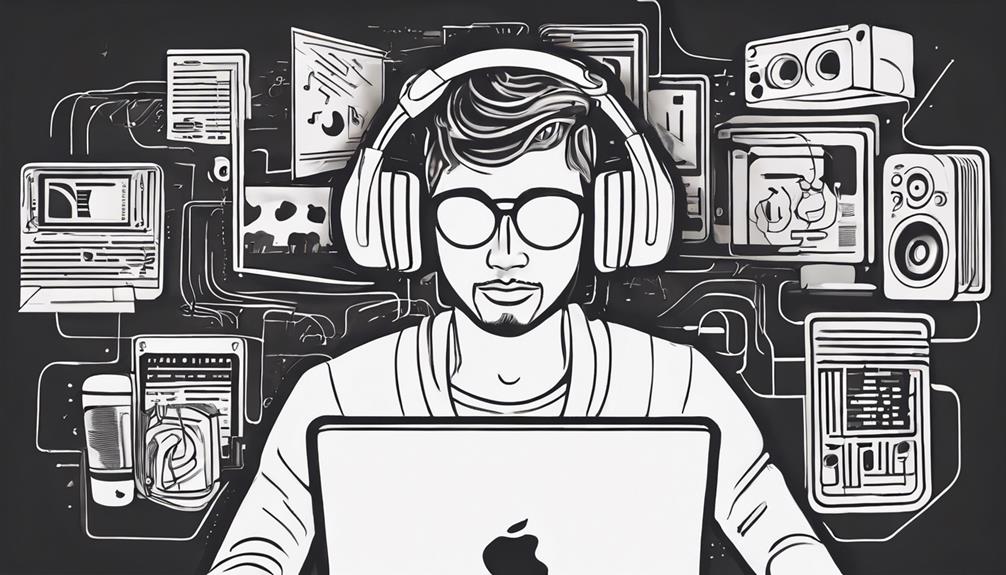
Stay informed about the latest music production trends by following industry publications like Sound on Sound and MusicTech. These sources provide valuable insights into new technologies, techniques, and industry developments.
Joining online forums such as Gearslutz and Reddit's r/WeAreTheMusicMakers can also help you stay updated on current production trends through discussions with fellow music producers.
To explore further into emerging trends, consider attending music production workshops, webinars, and conferences. These events offer hands-on learning experiences and access to industry experts who can guide you through the latest advancements in music production.
Another way to stay in the loop is by subscribing to YouTube channels run by music producers and industry experts. They often share valuable insights, tutorials, and updates on music production trends.
Engaging with social media platforms like Instagram and Twitter can also expose you to tips, tricks, and news shared by music production professionals. By actively participating in these online communities and resources, you can stay up-to-date with the ever-evolving world of music production.
Frequently Asked Questions
How to Begin Learning Music Production?
To start learning music production, immerse yourself in online resources for basic concepts. Develop a plan with goals, acquire essential gear like a DAW and headphones, engage with communities, and practice creating beats and melodies to refine your skills.
What Is the Fastest Way to Learn Music Production?
Ready to excel in music production rapidly? Immerse yourself in online courses, engage with communities, participate in workshops, team up with peers, and continuously explore. The journey to mastery is marked by curiosity, commitment, and a readiness to challenge yourself.
How I Taught Myself Music Production?
You taught yourself music production by diving into online resources, avoiding gear distractions, and focusing on hands-on practice. Discovering tools like Auxy, MiRack, and VCV Rack helped you grasp concepts effectively. Keep experimenting and learning!
How Do I Learn Music From the Beginning?
Start by mastering music theory basics: notes, scales, and chords. Explore various digital audio workstations (DAWs) to find your fit. Practice crafting simple beats and melodies to enhance your skills. Join online communities for insights. Get quality studio headphones for accurate sound.
Conclusion
Ready to elevate your music production skills to the next level?
With the right tools, knowledge, and passion, you can start creating your own masterpieces today.
So, why hesitate any longer?
Immerse yourself in the world of music production and let your creativity soar.
Who knows, you might just be the next big name in the industry!


